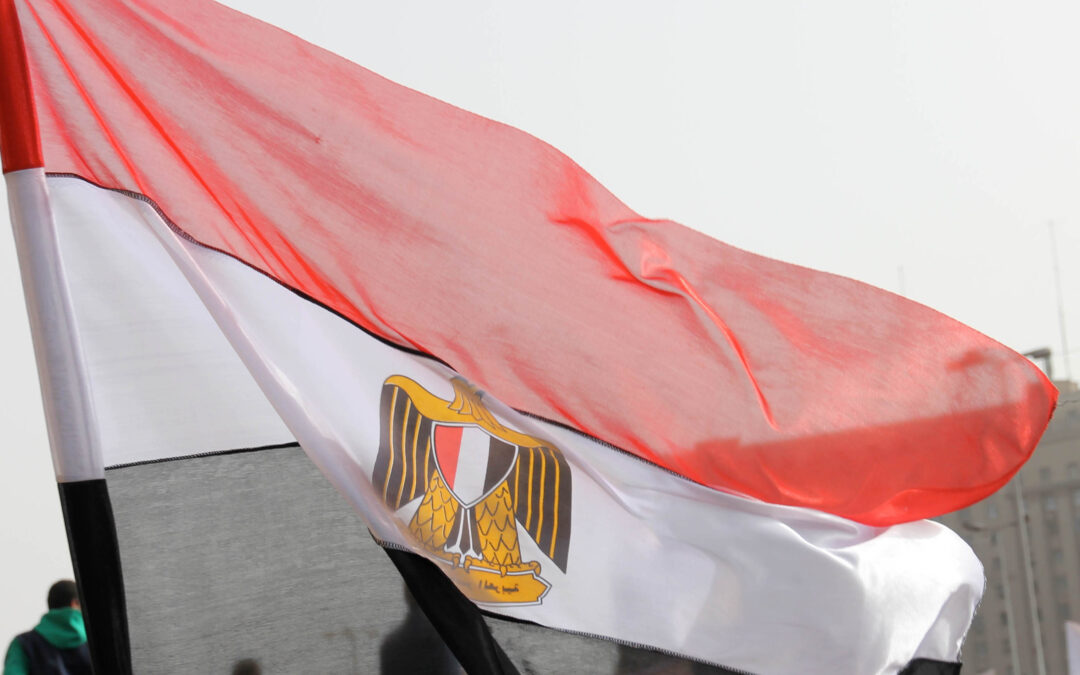
Mar 28, 2019 | Advocacy, Non-legal submissions
Today, the ICJ and Adalah for Rights and Freedoms (Adalah) filed a submission to the Human Rights Council’s Working Group on the Universal Periodic Review in advance of its review of Egypt’s human rights record in November 2019.
In their submission, the ICJ and Adalah drew the the attention of the Working Group on the UPR to the following concerns:
- arbitrary arrests and detentions and systematic use of pre-trial detention;
- the systematic use of torture, ill-treatment and enforced disappearance;
- the imposition of death penalty following unfair trials; and
- the politicization of the judiciary and the use of courts as a tool of repression.
The ICJ and Adalah called on the Working Group and the Council to urge the Egyptian authorities to :
- End the practice of holding detainees incommunicado;
- End all other forms of arbitrary detention;
- Comprehensively reform the pre-trial detention framework, including by ensuring that resort to it is exceptional, and that such detention may be ordered only when it is determined on the basis of evidence that it is necessary, proportionate and reasonable in the circumstances of the individual case;
- Ensure that pre-trial detention is not mandatory for all individuals charged with a particular category of felony or misdemeanor, or based on the potential sentences for the offences alleged;
- Ratify the International Convention for the Protection of All Persons from Enforced Disappearance (CED);
- Enact a crime of enforced disappearance in the Egyptian Criminal Code consistent with article 2 of the CED;
- Amend article 126 of the Criminal Code with a view to enacting a crime of torture consistent with article 1 of the CAT;
- Accept independent monitoring of detention facilities by allowing independent observers immediate access to detainees and prisoners, and to that end, accede to the Optional Protocol to the CAT;
- Implement all the recommendations of the CAT following its article 20 inquiry;
- Amend Egyptian law and abolish the use of the death penalty;
- Pending abolition, implement an immediate moratorium on all executions and on the imposition of capital punishment, including in cases of involving intentional killings;
- Pending abolition, ensure that proceedings in death penalty cases conform to the highest standards of judicial independence, competence and impartiality, and strictly comply with all fair trial rights;
- Pending abolition, ensure that the right to appeal in death penalty cases include review of both the factual and the legal aspects of the case by a higher ordinary, independent and impartial tribunal;
- Pending abolition, provide for the right of individuals convicted in death penalty cases to seek a pardon, commutation of sentence or clemency.
- Ensure that all convictions in death penalty cases that followed unfair trails are quashed;
- End Executive interference in judicial affairs;
- Limit the jurisdiction of military courts to trials of military personnel only for breaches of military discipline; and
- Abolish Emergency State Security Courts.
Egypt-Adalah_ICJ UPR-Advocacy-Non Legal Submissions-2019-ENG (full text of submission, in PDF)
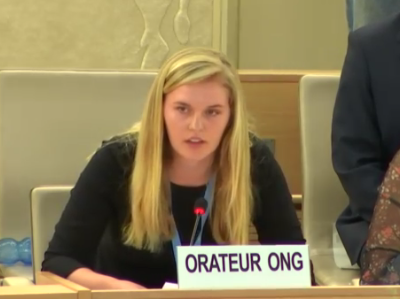
Mar 18, 2019 | Advocacy, Non-legal submissions
The ICJ today called for prompt release of a database of businesses involved in certain activities in the Occupied Palestinian Territory, that has been prepared by the UN Office of the High Commissioner for Human Rights (OHCHR).The statement, delivered in a general debate, read as follows:
“Regarding the Database of business enterprises involved in listed activities in the settlements on the Occupied Palestinian Territory, the ICJ recognizes the important work that has been done, but is deeply concerned at OHCHR’s failure to publicly release it.
All States, including the home States of the companies involved, have a responsibility to prevent companies from operating in breach of international law. Businesses themselves should see the database as an opportunity to more proactively incorporate respect for human rights within their policies and operations.
The prompt publication of the database should contribute to global efforts to hold all business enterprises accountable for their role in violations of human rights and humanitarian law and to give them an incentive to cease in such behaviour. The ICJ urges all States, including those that have supported the creation of this database, to redouble efforts to prevent business complicity in serious human rights abuses and to hold businesses legally accountable when abuses occur in their own territories as well as in the global operations of businesses for which they are the home State.”
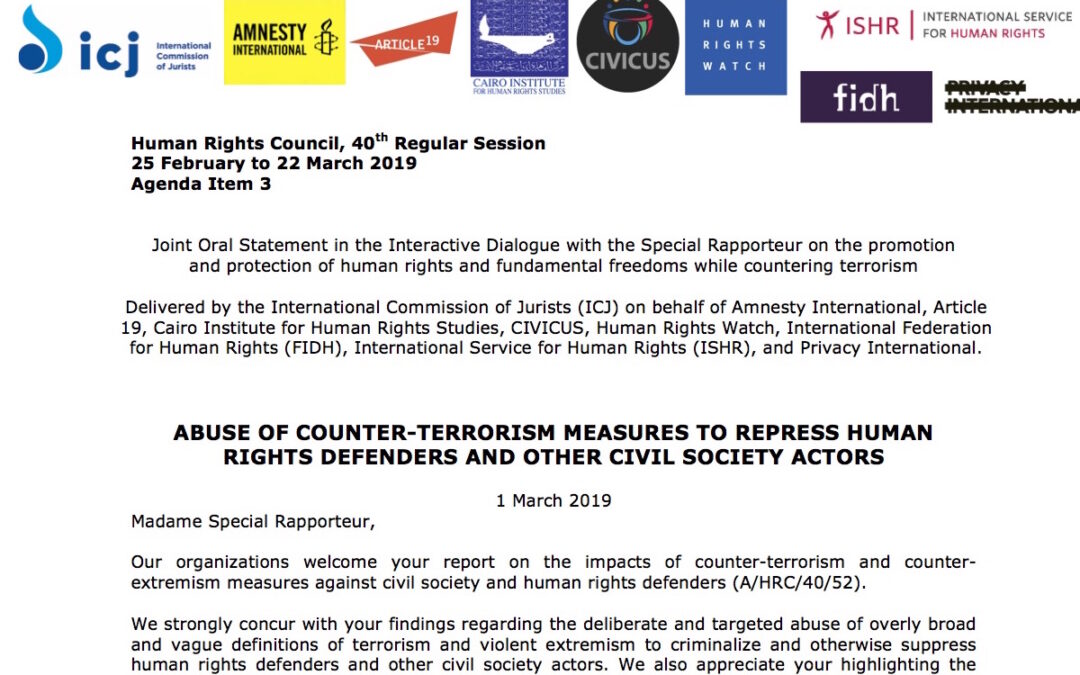
Mar 1, 2019 | Advocacy, Non-legal submissions
The ICJ today delivered a joint oral statement to the UN Human Rights Council, addressing the abuse of counter-terrorism measures to repress human rights defenders and other civil society actors, and highlighting deep concerns about possible moves to allow Egypt a significant role over the UN’s independent expert on human rights and counter-terrorism.
The statement was delivered in an interactive dialogue with the UN Special Rapporteur on the promotion and protection of human rights and fundamental freedoms while countering terrorism. The ICJ made the statement jointly on behalf of Amnesty International, Article 19, Cairo Institute for Human Rights Studies, CIVICUS, Human Rights Watch, International Federation for Human Rights (FIDH), International Service for Human Rights (ISHR), and Privacy International.
The organisations had earlier sent a joint letter to all States’ delegations to the Council in Geneva, highlighting Egypts appalling record of abuse of counter-terrorism measures, and urging States to strongly oppose any attempts to weaken the mandate of the Special Rapporteur, whether by diluting or distorting it by importing the flawed Egyptian-led approach into the Mexican-led resolution for its renewal, or any moves by longstanding leader Mexico to share co-leadership of the mandate renewal resolution with Egypt or other States with such an appalling record in relation to the very issues the mandate is to address.
The joint oral statement to the Council read as follows (check against delivery):
“Madame Special Rapporteur,
Our organizations welcome your report on the impacts of counter-terrorism and counter-extremism measures against civil society and human rights defenders (A/HRC/40/52).
We strongly concur with your findings regarding the deliberate and targeted abuse of overly broad and vague definitions of terrorism and violent extremism to criminalize and otherwise suppress human rights defenders and other civil society actors. We also appreciate your highlighting the need to prevent indirect impacts on civil society.
Among those States with a particularly appalling record of deliberate and targeted abuse, Egypt, which is mentioned in your report (paras 53 and 56), is a prominent example. As Human Rights Watch recently stated: “Using counterterrorism as a guise to crush all forms of dissent could be Egypt’s hallmark of 2018… There’s simply not much room left to peacefully challenge the government without being detained and unfairly prosecuted as a ‘terrorist’.”[1] Other examples from the reports before the Council include Turkey (para 53), Saudi Arabia (A/HRC/40/52/Add.2 paras 21-29), and China particularly as regards Uyghurs and Kazakhs (paras 55 and 57).
We share your concern about the elements lost from the previous Human Rights Council and General Assembly resolutions on “protection of human rights and fundamental freedoms while countering terrorism” in their March 2018 merger with the deeply flawed Egyptian-led initiative on “effects of terrorism” (para 29). We reiterate our call from March 2018 for future versions of the resolution to address the relevant issues exclusively and comprehensively from the perspective of the effective protection of human rights.[2] We strongly oppose any attempts to dilute your mandate, including by importing the flawed Egyptian-led approach into the resolution for its renewal, or any sharing of co-leadership of the mandate renewal resolution with States that have such an appalling record in relation to the very issues the mandate is to address.
Madame Rapporteur, beyond the particular cases mentioned in your report (para 53), what are your views on the broader situation within Egypt in terms of abuse of counter-terrorism measures and what can States, the United Nations, civil society, and other stakeholders do to stop such abuses in the name of counter-terrorism in Egypt and other egregious situations?
Thank you.
[1] https://www.hrw.org/news/2019/01/17/egypt-new-moves-crush-dissent (17 January 2019). See also among others: Human Rights Watch World Report 2019, https://www.hrw.org/world-report/2019/country-chapters/egypt; EuroMed Rights, Egypt – Finding Scapegoats: Crackdown on Human Rights Defenders and Freedoms in the Name of Counter-terrorism and Security (Feb 2018) https://euromedrights.org/wp-content/uploads/2018/03/EuroMed-Rights-Report-on-Counter-terrorism-and-Human-Rights.pdf; Joint NGO Statement, Egypt: Civil society faces existential threat (23 June 2016) https://www.icj.org/wp-content/uploads/2016/06/Egypt-Advocacy-JointNGOStatement-2016.pdf.
[2] Joint NGO end-of-session statement (23 March 2018) https://www.icj.org/hrc37-endofsession/.”
The statement can be downloaded in PDF format here: HRC40-JointOralStatement-SRCTHR-2019-EN
For more information email un(a)icj.org.
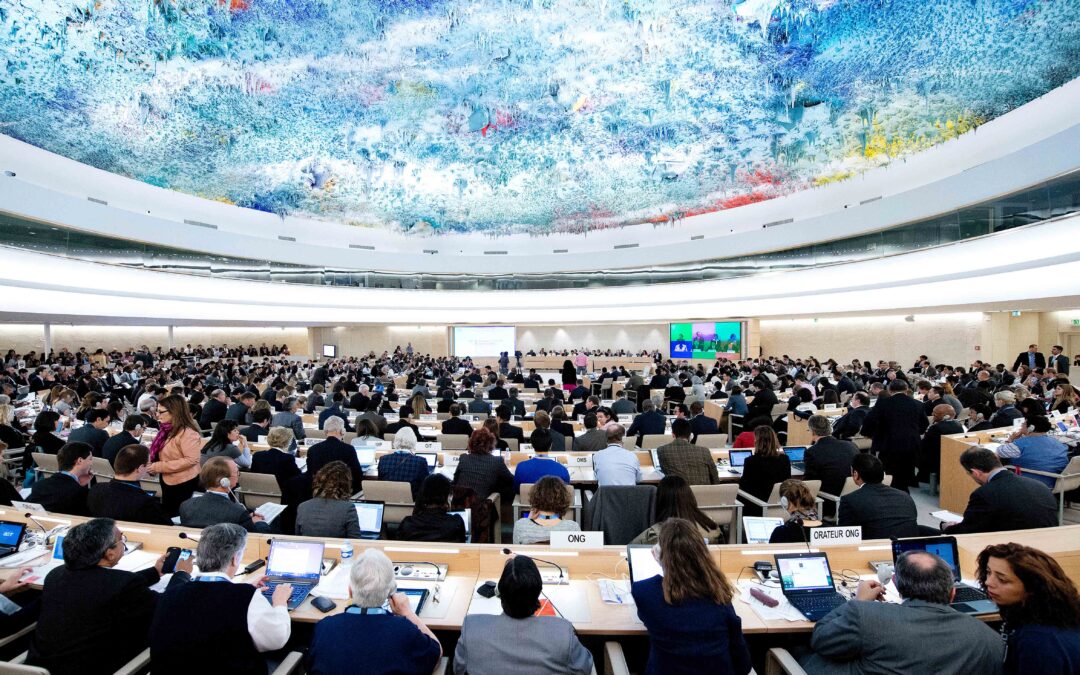
Sep 28, 2018 | Advocacy, Non-legal submissions
The ICJ joined other civil society organisations in addressing the UN Human Rights Council, on the successes and failures of its 39th session, concluding today.
The statement, read by International Service for Human Rights (ISHR), was as follows:
“This session, the Council adopted landmark resolutions on several country situations, further enhancing its contribution to the protection of human rights.
On Myanmar, we welcome the creation of the independent investigative mechanism, which is an important step towards accountability for the horrific crimes committed in Myanmar, as elaborated in the FFM’s report to this session. The overwhelming support for the resolution, notwithstanding China’s shameful blocking of consensus, was a clear message to victims and survivors that the international community stands with them in their fight for justice.
On Yemen, the Council demonstrated that principled action is possible, and has sent a strong message to victims of human rights violations in Yemen that accountability is a priority for the international community, by voting in favour of renewing the mandate of the Group of Eminent Experts to continue international investigations into violations committed by all parties to the conflict.
Furthermore, we welcome the leadership by a group of States on the landmark resolution on Venezuela, and consider it as an important step for the Council applying objective criteria to address country situations that warrant its attention. The resolution, adopted with support from all UN regions, sends a strong message of support to the Venezuelan people. By opening up a space for dialogue at the Council, the resolution brings scrutiny to the tragic human rights and humanitarian crisis unfolding in the country.
While we welcome the renewal of the mandate of the Commission of Inquiry (CoI) on Burundi, to continue its critical investigation and work towards accountability, however we regret that the Council failed to respond more strongly to Burundi’s record of non-cooperation and attacks against the UN human rights system.
We also welcome the Council’s adoption of the resolution on Syria, which among other things condemns all violations and abuses of international human rights law and all violations of international humanitarian law committed by all parties to the conflict.
However, on other country situations including China, Sudan, Cambodia and the Philippines, the Council failed to take appropriate action.
On Sudan, we are deeply concerned about the weak resolution that envisions an end to the Independent Expert’s mandate once an OHCHR office is set up; a “deal” Sudan has already indicated it does not feel bound by, and which is an abdication of the Council’s responsibility to human rights victims in Sudan while grave violations are ongoing. At a minimum, States should ensure the planned country office monitors and publicly reports on the human rights situation across Sudan, and that the High Commissioner is mandated to report to the Council on the Office’s findings.
We also regret the lack of concerted Council action on the Philippines, in spite of the need to establish independent international and national investigations into extrajudicial killings in the government’s ‘war on drugs’, and to monitor and respond to the government’s moves toward authoritarianism.
In addition, we regret the Council’s weak response to the deepening human rights and the rule of law crisis in Cambodia, failing to change its approach even when faced with clear findings by the Special Rapporteur demonstrating that the exclusive focus on technical assistance and capacity building in the country is failing.
We share the concerns that many raised during the session, including the High Commissioner, about China’s own human rights record, specifically noting serious violations of the rights of Uyghurs and other predominantly Muslim minorities in Xinjiang province. It is regrettable that States did not make a concrete and collective call for action by China to cease the internment of estimates ranging up to 1 million individuals from these communities.
On thematic resolutions, we welcome the adoption of the resolution on equal participation in political and public affairs but would have preferred a stronger endorsement and implementation of the Guidelines.
The resolution on safety of journalists, adopted by consensus, sets out a clear roadmap of practical actions to end impunity for attacks. Journalism is not a crime – yet too many States in this room simply imprison those that criticize them. This must end, starting with the implementation of this resolution.
We welcome the adoption by consensus of the resolution on preventable maternal mortality and morbidity and human rights in humanitarian settings. Women and girls affected by conflict have been denied accountability for too long. The implementation of this resolution will ensure that their rights, including their sexual and reproductive health and rights, are respected, protected and fulfilled.
Finally, the Council’s first interactive dialogue on reprisals was an important step to ensure accountability for this shameful practice, and we urge more States to have the courage and conviction to stand up for defenders and call out countries that attack and intimidate them.”
Signatories:
- The African Centre for Democracy and Human Rights Studies (ACDHRS)
- Amnesty International
- Article 19
- Center for Reproductive Rights
- CIVICUS
- DefendDefenders
- FIDH
- Forum Asia
- Human Rights House Foundation (HRHF)
- Human Rights Watch
- International Commission of Jurists
- International Service for Human Rights (ISHR)
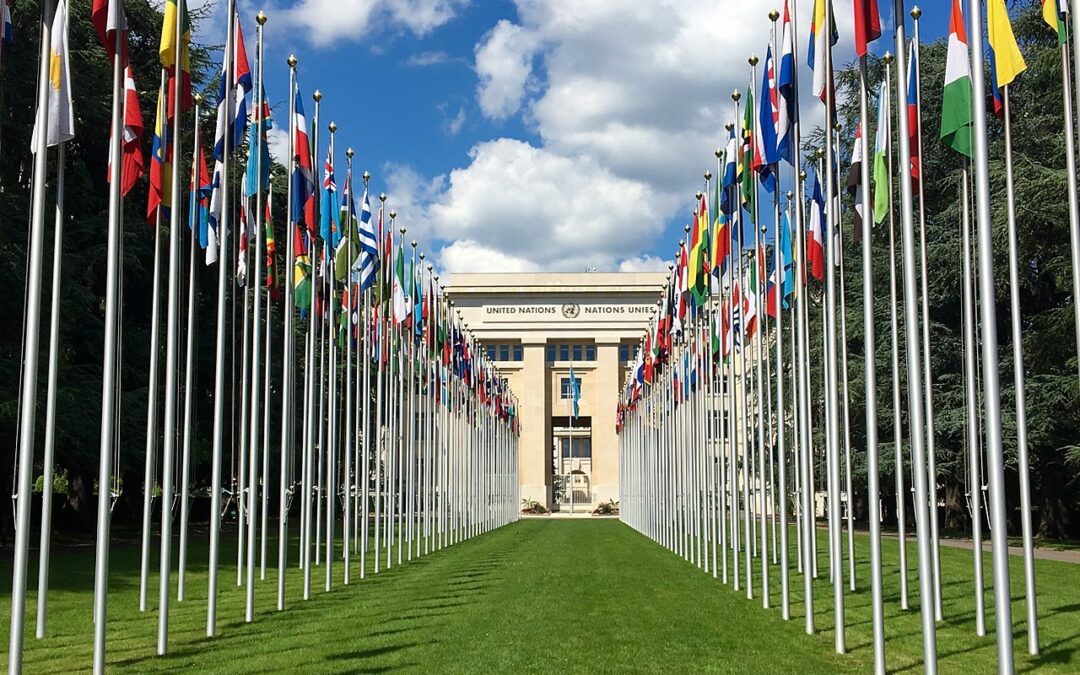
Sep 26, 2018 | Advocacy, Non-legal submissions
The ICJ today emphasised the continuing failure of domestic accountability mechanisms to ensure proper accountability for crimes under international law in Libya, speaking at the UN Human Rights Council in Geneva.
The statement, made during an Interactive Dialogue with the UN High Commissioner for Human Rights on her oral update on the situation in Libya, at the Human Rights Council in Geneva, read as follows:
“Mr President,
The International Commission of Jurists (ICJ) remains concerned by the scale and magnitude of the human rights violations that continue in Libya, and the failure of domestic accountability mechanisms to address them.
Impunity prevails for crimes under international law committed during and after the 2011 uprising, including extrajudicial killings, torture and other ill-treatment, and enforced disappearances. Broad amnesty laws allow those responsible to avoid prosecution.
Even in the rare cases where former officials of the Gadhafi regime have faced trial,[1] the integrity of the justice process has been compromised by failures to respect international fair trial standards, including the right to legal counsel and the right to call and examine witnesses.
On August 15, 2018, following an unfair mass trial, 99 defendants were convicted for the killing of 146 anti-Gaddafi protesters in Tripoli during the 2011 uprising.[2] 45 were sentenced to death, violating the right to life.
Such unfair trials and unlawful sentences not only violate the human rights of the accused: they deprive the victims of the crimes of the right to know the truth about the legacy of past violations and the legitimate and untainted justice to which they are entitled. New, fair trials are required.
Political and security instability in Libya undermines the ability of the judiciary to administer justice independently and impartially, including with a view to combating impunity. Judges and prosecutors are threatened, intimidated, abducted and in some instances killed, particularly when attempting to address crimes by members of armed groups.
The ICJ would like to ask the High Commissioner, how can other States and civil society help ensure that Libya, while fully cooperating with the International Criminal Court, implements an effective legal and practical framework to address crimes under international law and eradicate impunity?
Thank you.”
[1] Case 630/2012.
[2] https://www.hrw.org/news/2018/08/22/libya-45-sentenced-death-2011-killings.
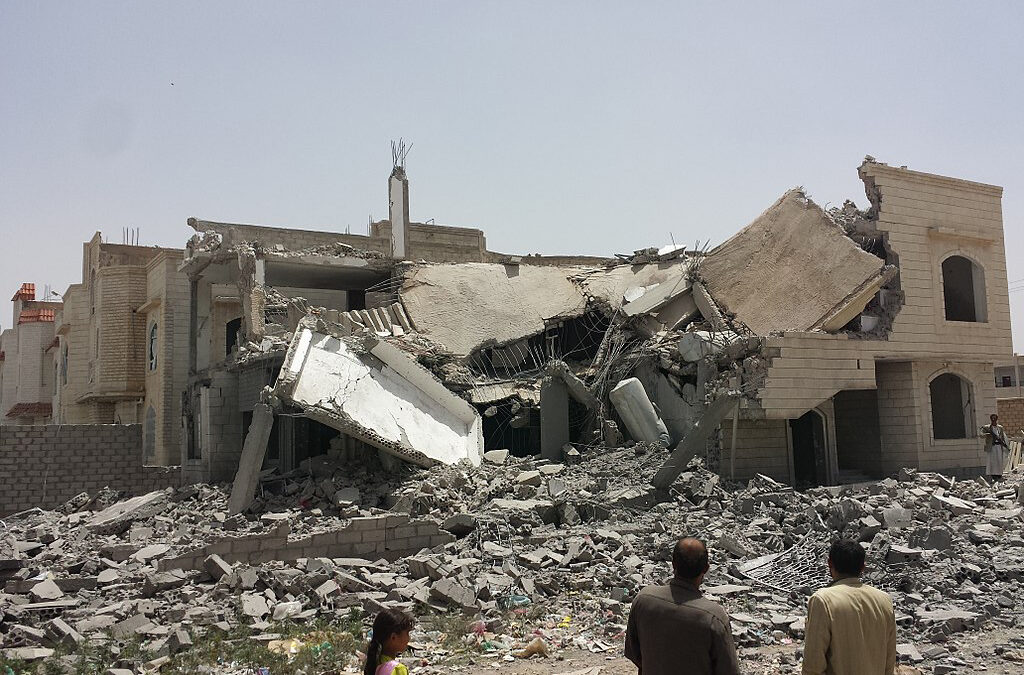
Jul 24, 2018 | Advocacy, Analysis briefs, News
In a briefing paper published today, the ICJ called on the parties to the conflict in Yemen to take immediate and effective measures to ensure the protection of the civilian population, including against human rights abuses and international humanitarian law violations.
Serious violations of international humanitarian law committed in Yemen include direct and indiscriminate attacks against civilians and the impediment of access to humanitarian relief of the civilian population.
Gross human rights violations and abuses include widespread instances of arbitrary arrest and detention, torture and ill-treatment, and enforced disappearances.
The ICJ has called for persons responsible for such violations to be held to account.
“All parties to the conflict in Yemen have acted in blatant disregard of the most basic rules of international humanitarian law and human rights law,” said Said Benarbia, ICJ MENA Director.
“The top priority is to end these violations and in particular to protect the civilian population,” he added.
In its briefing paper, the ICJ analyses international law violations committed in the conduct of hostilities and against persons deprived of their liberty.
The Saudi Arabia-led coalition and the Houthis are allegedly responsible for direct, indiscriminate or disproportionate attacks against civilians and civilian objects, including local markets, food storage sites, water installations and medical facilities.
The United Arab Emirates, the internationally recognized government of Yemen and the Houthis have allegedly engaged in arbitrary arrest and detention, torture and ill-treatment, and enforced disappearances.
The ICJ briefing paper also examines the potential legal implications of the blockade imposed by the Saudi Arabia-led coalition on Yemen and the sieges laid by the Houthis against several towns and localities, which impede the civilian population to access humanitarian relief.
The ICJ briefing paper further assesses the potential responsibility of third States for transferring arms to the parties to the conflict.
Under numerous instruments, including the Arms Trade Treaty, States are prohibited from selling arms to the parties to an armed conflict whenever a risk exists that the end-user could commit international law violations.
Arms transfers may even engage the exporting States’ international responsibility for aiding or assisting in the commission of such violations.
“Victims must have access to effective legal remedies and be provided with adequate reparation,” Benarbia said.
“The international community must state loud and clear that impunity is not an option. The Security Council should refer the situation in Yemen to the International Criminal Court and third States should consider, where feasible, the exercise of universal jurisdiction to prosecute relevant crimes under international law,” he added.
Contact
Vito Todeschini, Associate Legal Adviser, ICJ Middle East and North Africa Programme, t: +216-71-962-287; e: vito.todeschini(a)icj.org
Said Benarbia, Director of the ICJ Middle East and North Africa Programme, t: +41-22-979-3817; e: said.benarbia(a)icj.org
Yemen-War briefing-News-web story-2018-ENG (full story with background information, English, PDF)
Yemen-War impact on populations-Advocacy-Analysis Brief-2018-ENG (Analysis Brief in English, PDF)
Yemen-War briefing-News-web story-2018-ARA (full story with background information, Arabic, PDF)
Yemen-War impact on populations-Advocacy-Analysis Brief-2018-ARA (Analysis Brief in Arabic, PDF)










